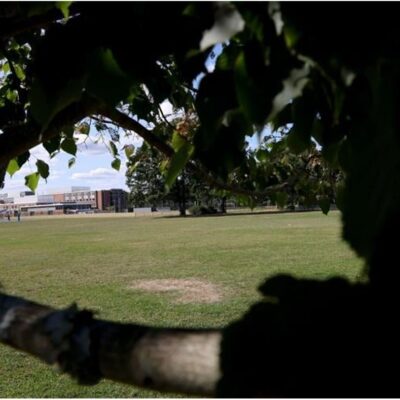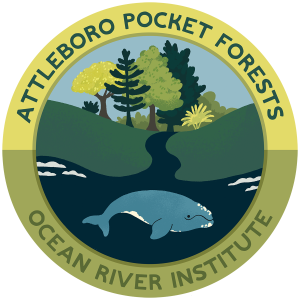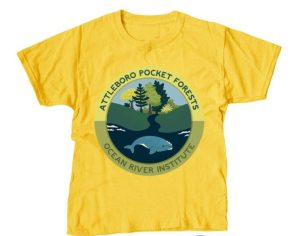Residents of Attleboro, Massachusetts, have had enough of the destruction caused by stormwater carrying heat and pollutants to the sea, and are concerned about the plight of right whales. They are taking steps to redirect rainwater to seep into the ground, with plans to build a 2,000-square-foot Miyawaki pocket forest in O’Connell Field at Capron Park, near the High School. Hopefully, this will be the first of many to follow.
Attleboro addresses climate change by slowing down water flow, increasing infiltration into the ground to boost plant photosynthesis, supporting more soil life with added moisture, recharging streams, restoring land, and preventing wildfires.
Ocean River Institute summer interns, concerned about the plight of right whales suffering from stormwater pollution and water warmed by urban surfaces, approached Attleboro to create a pocket forest that would have ten times the soil and hold ten times the water of a stand of trees. They were well received by Attleboro’s conservation department and sustainability committee. Attleboro is concerned with stormwater management because property owners suffered damage from flooding and fast-flowing, sediment-laden water that no longer infiltrates the ground.
Make a donation to buy a tree for Attleboro’s pocket forest.
Akira Miyawaki observed that trees near temples are more lush due to the great diversity of species compared to trees in a forest. He also noted that it takes a hundred years for a field to become a mature forest. A Miyawaki forest is a dense planting of approximately 35 different woody plant species from various stages of succession, including sumacs, cedars, old-growth oaks, maples, and beeches. The roots of these plants intertwine into fungal strands to form a single mycorrhizal network. Bacteria along and at the ends of these networks prepare plant nutrients and minerals. Spread across the wood-wide web, whatever one plant cell requests is accessible to all other plants on the network. As a result, a Miyawaki forest exhibits ten times the growth, ten times the soil depth, and greater water-holding capacity compared to a stand of a single tree species. Moisture in the ground reduces stormwater damage, waters plants, and helps recharge rivers during the dry summer months.
Image: ORI Summer interns at the Miyawaki Forest in Denehy Park, Cambridge, 2024.
Attleboro benefits significantly from pocket forests. Trees grow quickly and reach full maturity in 20 to 30 years. The pocket forest enhances biodiversity by supporting a greater variety of wildlife, including migrating birds. Vegetation filters pollutants, leading to cleaner air. Deep soils hold more water; four inches of soil can retain seven inches of rainwater thanks to sticky carbohydrates that keep mineral particles spaced. A reduction in heat islands provides a cooling effect. Overall, the community space has improved in visual appeal and now offers more recreational opportunities.
Image: Aerial view photograph of O’Connell Field, Attleboro. The red circle indicates the location where the first pocket forest is planned to be established.
The plans involve creating a small pocket forest of about 2,050 square feet in O’Connell Field, visible from the entrance to Capron Park Zoo. The plants are spaced only eighteen inches apart, allowing the tall, vigorous woody species to compete for sunlight. To minimize trampling of the prepared soil, volunteers will form teams of eight to plant native woody plants for a half-hour period, preceded by a fifteen-minute training session.
Purchasing thirty-five different types of trees and shrubs in sufficient numbers and preparing the soil will incur costs. A foundation has challenged us to match dollar-for-dollar donations for the purchase of trees. Funds raised by the Ocean River Institute will go to the designated Attleboro town fund. Businesses are encouraged to make direct donations to the Attleboro Pocket Forest fund. Funds unspent this fall will be held for the next pocket forest. O’Connell Field has space to plant five pocket forests, one a year.
 Volunteer to help at an educational outreach table
Volunteer to help at an educational outreach table
Please indicate your time preferences on this form.
What happens in Attleboro does not stay in Attleboro; it harms or benefits everyone.
Please support the endeavors of Attleboro residents to plant a pocket forest featuring a diverse array of native woody plants. This will become the first Miyawaki forest planted to slow down stormwater and rehydrate the land by retaining more water in the ground.
Annual rainfall has not changed. Unfortunately, we have removed so much vegetation and soil, replacing them with hardscape and heat islands, that now stormwater ravages the land and contributes to rising sea levels.
Right whales and all marine life suffer when pollutants and heat are dumped into the sea. Phytoplankton productivity in the Gulf of Maine has decreased by 60%, and copepods have less fat, causing whales to consume more to obtain the same nutrition.
Rehydrating the land adds moisture to healthy soils, which sustains life, fosters more plant growth, benefits pollinators and wildlife, maintains river flow during dry periods, reduces the transport of heat from stormwater runoff to warm the ocean, and cools the climate.
Donate in support of Attleboro’s Pocket Forest.
Attleboro Pocket Forest tee, sweatshirts, and hoodies
We’re planting a diverse array of native trees in Attleboro to reduce stormwater and restore the realm of the right whales.



















